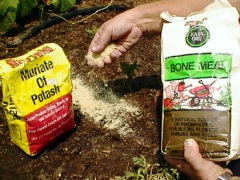 Government, through the Ministry of Food and Agriculture (MOFA), has over the past years subsidized fertilizer for farmers in a bid to see a jump in agricultural output for food security.
Government, through the Ministry of Food and Agriculture (MOFA), has over the past years subsidized fertilizer for farmers in a bid to see a jump in agricultural output for food security.
The Farmers are offered fertilizer subsidy rates to increase fertilizer application rate in the country.
The policy includes absorbing port and transportation charges, agents’ commission and margins to the fertilizer companies to arrive at prices that are affordable to the small-scale farmers.
But agricultural specialists say this is not enough to achieve the desired impact in the sector.
Senior Agricultural Economist at the World Bank Office in Ghana, Jan Nijhoff, acknowledged the sector is doing well, but believes the next big thing is investments in seed production and distribution. “If we have to increase productivity, we have to sought out the seeds sector; fertilizer subsidies are not enough. Fertilizer without good seed as we all know is not enough, so we need to work on the seeds sector, the grains in particular.
“In legumes I think we have made some progress but in the grains sector – the maize, rice, sorghum, millet – there is a lot of work to be done and a lot of that would be done by private enterprises as well as by the public investments made in the development of technology”, Mr. Nijhoff told Luv Biz Report in Kumasi.
According to him such investments should be extended to the provision of storage facilities and functional markets for farmers.
Similar concerns on the availability of seeds for farmers have been expressed by Dr. Hans Adu-Dapaah, the Director of the Crops Research Institute (CRI) of the Council for Scientific and Industrial Research (CSIR).
He observed the seeds are not getting to the hinterlands where the small-holder farmers are located, because most of the seed companies are situated in the regional capitals.
“We have come up with varieties – maize varieties – that can give you 5 tonnes, farmers are getting about less than one tonne and it’s because they are not able to afford the inputs that go with the technologies”, said Dr. Adu-Dapaah.
For him, mechanisms should be in place to get the seeds and other technologies to the rural areas to improve productivity.
From: Kofi Adu Domfeh/Luv Fm

